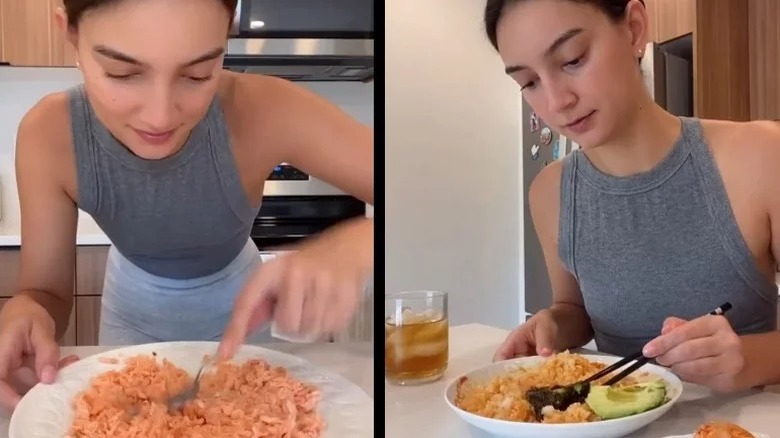The Truth About Viral Food Influencer Emily Mariko
TikTok's recipe card index is one we flip through every other week; collectively made by innovative food creators, these viral recipes are usually simple, wholesome, and easy to follow. It's no wonder, then, that 164 million viewers are still captivated by the infamous baked feta pasta. Meanwhile, the endlessly customizable tortilla wrap hack has 4.8 billion views while the coconut water nature cereal made its way onto Lizzo's dining table. For the most part, these viral recipes are associated with the app.
However, salmon with leftover microwaved rice, sprinkled with the "that girl" aesthetic, is unequivocally associated with Emily Mariko, the influencer who went viral for sharing the recipe. Earlier last year, Mariko garnered 80 million views for her deconstructed onigiri bowl Tiktok, titled "Best lunch of the week!" It was one of her best performing videos; many of her recipe videos come from her own Japanese ethnicity, according to The Infatuation. But many, especially Asian Americans, believe that the recipe is quite ordinary and that its viral quality comes from the aesthetic.
Emily Mariko's appeal is multifaceted
Emily Mariko's videos emanate a cool, calm, and collected aesthetic that feels, to say the least, aspirational. Punctuated by chopping board ASMR, organized stocked pantries, and deeply satisfied sighs from Mariko tasting her dishes, the videos appeal to anyone who wants that level of high-functioning living. The Cut's beauty director Kathleen Hou explained to the publication that "[Mariko's] food is healthy without being strange or preachy about it ... Like, she eats Philadelphia cream cheese. I can't remember the last time any wellness featured cream cheese."
However, some viewers are also bringing attention to the fact that Mariko's ethnically ambiguous appearance could have something to do with the way her food is being perceived. "White people think non-white people are gross, so whatever they present will be gross. Other white people or white looking people presenting the same food? Suddenly it's innovative," one Redditor commented. Meanwhile, food writer Bettina Makalintal tweeted,"it is kind of funny to see people putting stuff on rice and calling it a trend lol that's just being Asian."
But some have said they feel represented by Mariko. Her Campus writer Kendall Foley, who is also of Japanese and European descent, said, "I can think of many distinctly Japanese experiences I've had and many that were distinctly white, but few that truly represented my mixed identity. For me, Mariko's salmon rice dish represents my full, complete identity." Mariko's appeal is clearly multifaceted and these discussions show that it's worth examining why.

